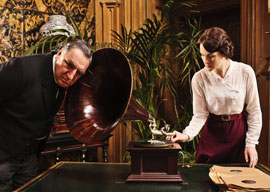
January 09, 2014

The idea of knowing one’s place belongs to a conception of society that historian David Hackett Fischer called “hegemonic liberty,” summarized by John Randolph of Roanoke in the words: “I love liberty: I hate equality.” Here’s Fischer, after explaining how this notion was carried from England to the Tidewater South in the 17th century by “distressed cavaliers,” the losing side in the English Civil War:
To a modern mind, hegemonic liberty is an idea at war with itself. We think of it as a contradiction in terms. This is because we no longer understand human relationships in hierarchical terms, and can no longer accept the proposition that a person’s status in the world is determined and even justified by his fortune.
That’s all long gone now. None of us knows his place anymore. Some of us never wanted to. One of the maids at Downton Abbey, unhappy with her servant status, enrolls in a correspondence course and leaves to work as a secretary. At the other end of the social scale, Lady Edith Crawley, born to wealth and privilege, takes up the lowly and degrading occupation of writing opinion columns for publication.
My mother was one of these rebels. That spell of domestic service convinced her that any other kind of employment would be preferable, so she became a professional nurse.
I’m not sure I would have been of the same temper. In an unguarded moment once, I told an interviewer that I might give up writing to work as a butler. Domestic service is in fact making a comeback. I can”t see that assisting Lord Moneybags with his toilet or supervising his kitchen is less honorable than cutting code for Mark Zuckerberg or writing copy for Rupert Murdoch (though a butler’s employer nowadays is more likely to be a Russian oligarch or Chinese princeling).
And hegemonic liberty, for all its inequities, had something to be said for it politically. As Fischer points out, it conformed sufficiently to the basics of human nature to be a stable foundation for a self-organizing society, needing minimal government. Fischer:
The largest possibility in this idea of hegemonic liberty lay in its conception of dominion over self….Every gentleman fell short [but] the ideal itself was pursued for many generations. At its best, it created a true nobility of character in Virginia gentlemen such as George Washington, Robert E. Lee, and George Marshall.
We could do worse.